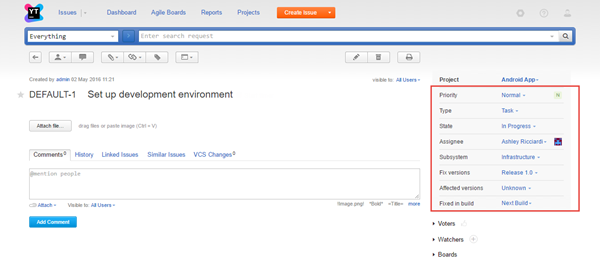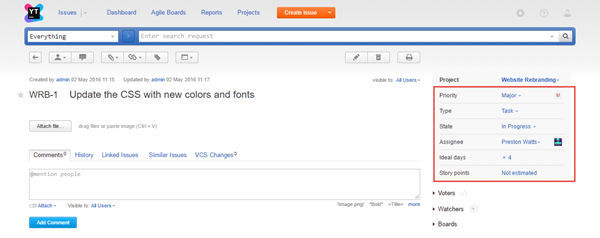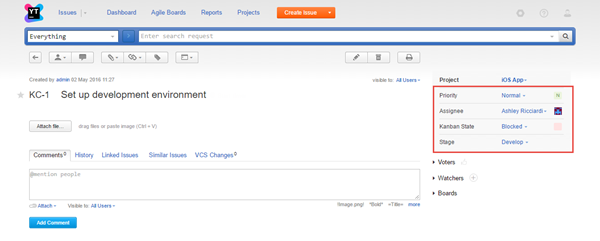Default Custom Fields
A set of default custom fields is attached to all new projects in YouTrack. These fields contain attributes and properties that are commonly used for software development.
If you use YouTrack to manage your software development projects, you can start working with these fields right out of the box. For other types of projects, you can add new custom fields or modify the default fields to support your internal workflows. For more information, see Create and Edit Custom Fields.
Default Fields for Default Projects
The following default custom fields are added to projects that are created with the Default project template.

These fields all have the auto-attach property enabled. If you enable this property for additional custom fields, they are also attached to projects that are created with the Default project template.
Field | Description |
|---|---|
Priority | Used to prioritize which issues need to be resolved first. Issues that are assigned the Show-stopper priority should be resolved before Critical issues, and so on. The following set of values is pre-configured:
Each value is assigned a color that corresponds with the severity of the condition. |
Type | Used to classify issues. The default set of values represents common types of issues that are used in a software development project. The following set of values is pre-configured:
|
State | Used to manage the lifecycle of an issue. The set of values that are used for the State field has an additional Resolved property. The general idea is to move an issue from an unresolved state to a resolved state. The following set of values is pre-configured to represent unresolved states:
The following set of values is pre-configured to represent resolved states:
|
Assignee | Used to assign an issue to a user. This field uses a special |
Subsystem | Used to classify an issue based on the software component that it relates to. This field uses the |
Fix versions | Used to indicate the version of the product in which the issue is to be resolved. This field is configured to store multiple values. The set of values is empty by default. If you want to use this field in your project, enter a set of values that matches the release versions of your product. |
Affected version | Used to indicate the version of the product that is affected by a defect or bug. The configuration of this field is similar to the Fix versions field. |
Fixed in build | Used to record the software build configuration in which the changes that address the issue were applied. This field uses a special build type. This type stores a build number from a predefined set of build numbers. When you integrate your YouTrack installation with JetBrains TeamCity, the field automatically stores the build numbers that are generated in TeamCity. YouTrack also adds a TeamCity icon next to each build number that is stored in the custom field. For more information, see TeamCity Integration. |
In addition to the default fields that are auto-attached to new projects, a new YouTrack installation includes an additional default field that does not have the auto-attach property enabled.
Field | Description |
|---|---|
Due Date | Used to set the date on or before which an issue should be resolved. This field uses the date data type. Fields with this type can be used, for example, in reports to show unresolved issues that have taken too long to fix. The Due Date custom field is also used in a default workflow that notifies an assignee when an issue is overdue. For additional information, see Due Date. |
Default Fields for Scrum Projects
The following default custom fields are added to projects that are created with the Scrum project template.

Projects that are created with this template ignore the auto-attach setting for other custom fields.
Field | Description |
|---|---|
Priority | Used to prioritize which issues need to be resolved first. Issues that are assigned the Show-stopper priority should be resolved before Critical issues, and so on. The following set of values is pre-configured:
Each value is assigned a color that corresponds with the severity of the condition. |
Type | Used to classify issues. The default set of values represents common types of issues that are used in Scrum development. The following set of values is pre-configured:
|
State | Used to manage the lifecycle of an issue. The set of values that are used for the State field has an additional Resolved property. The general idea is to move an issue from an unresolved state to a resolved state. In a project that follows the Scrum development methodology, these states are represented as columns on the agile board. The following set of values is pre-configured to represent unresolved states:
The following set of values is pre-configured to represent resolved states:
|
Assignee | Used to assign an issue to a user. This field uses a special |
Ideal days | Used to estimate the amount of time it would take to resolve an issue. Ideal days are usually based on the assumption that this is the only issue that is being worked on, there are no interruptions, and all of the resources that are required to resolve the issue are available. Ideal days are usually set for issues that are assigned the Task type. |
Story points | Used to measure the amount of effort that is required to implement a story. Story points are both abstract and arbitrary - the number of points does not correlate to a unit of time, and each development team can use their own set of values. A common practice in Scrum teams is to use numeric values that correspond to a Fibonacci sequence. Stories that are easy to implement are assigned the lowest value, while complex stories are assigned exponentially higher values. Story points are usually set for issues that are assigned the User Story type. |
Default Fields for Kanban Projects
The following default custom fields are added to projects that are created with the Kanban project template.

Projects that are created with this template ignore the auto-attach setting for other custom fields.
Field | Description |
|---|---|
Priority | Used to prioritize which issues need to be resolved first. Issues that are assigned the Show-stopper priority should be resolved before Critical issues, and so on. The following set of values is pre-configured:
Each value is assigned a color that corresponds with the severity of the condition. |
Assignee | Used to assign an issue to a user. This field uses a special |
Kanban State | Used to indicate whether a task is ready to move to the next stage of the development process. The following set of values is pre-configured:
Each value is assigned a color that corresponds with the current state. |
Stage | Used to manage the lifecycle of an issue. The set of values that are used for the Stage field has an additional Resolved property. The general idea is to move an issue from one stage to the next until the issue is resolved. In a project that follows the Kanban development methodology, these stages are represented as columns on the agile board and can also be associated with specific departments or teams. The following set of values is pre-configured to represent unresolved states:
The following value is pre-configured to represent the final stage in the Kanban process:
|